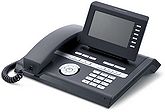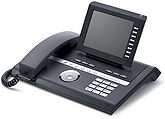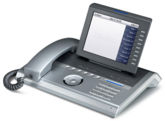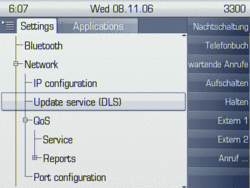OpenStage SIP
The Wiki of Unify contains information on clients and devices, communications systems and unified communications. - Unify GmbH & Co. KG is a Trademark Licensee of Siemens AG.
| 150px | 
|

|
| OpenStage 15 |
OpenStage 20 E OpenStage 20 OpenStage 20 G |
OpenStage 40 OpenStage 40 G |

|

| |
| OpenStage 60 OpenStage 60 G |
OpenStage 80 OpenStage 80 G |
The OpenStage phone family consists of the SIP phones:
- OpenStage 15
- OpenStage 20 E, OpenStage 20,
OpenStage 20 G - OpenStage 40, OpenStage 40 G
- OpenStage 60, OpenStage 60 G
- OpenStage 80, OpenStage 80 G
The G means that these phones have a 1000 Mbit Ethernet switch, phones with an E suffix have no full-duplex handsfree talking (open listening is available).
Contents
Phone range
Common features
The OpenStage family have a wide common feature set (listed below) and additional features per model (specified for each phone model).
- Standard based SIP support according to RFC 3261
- Power over Ethernet (PoE) IEEE 802.3af or external power supply (EU, US and UK power adapters)
- Computer Telephony Integration (CTI) / Third party call control
- Remote administration via Web-based management or HiPath Deployment Service
- Supported Codecs:
- Full-duplex hands-free talking (except OpenStage 20 E: open listening only)
- 2 ports 10/100Base-T built-in Ethernet switch (except OpenStage 20/40/60/80 G: 1000 Mbit Ethernet switch)
- Tiltable display (except OpenStage 15)
- External applications integrated into phone user interface:
- XML API (see OpenStage XML Applications)
- SDK Software Development Kit (see OpenStage XML Applications)
- Keypad with 12 keys
- Various housing colors and materials from model to model (ice blue, lava, silver blue metallic)
Display
| Display features | OpenStage 15 | OpenStage 20 | OpenStage 40 | OpenStage 60 | OpenStage 80 |
|---|---|---|---|---|---|
| Technology | LCD | LCD | LCD | TFT | TFT |
| Color | Monochrome | Monochrome | Monochrome | 16 bit depth | 16 bit depth |
| Size | 205x41 pixel | 205x41 pixel | 240x128 pixel | 320x240 pixel (QVGA) | 640x480 pixel (VGA) |
| Diagonal | N/A | N/A | 5.1" | 5.7" | 6.4" |
| Lines | 2 (24 characters) | 2 (24 characters) | 6 (Graphics) | Graphics | Graphics |
| Tiltable | No | |
|
|
|
| Backlit | No | No | |
|
|
Keys/LEDs
| Keys and LEDs features | OpenStage 15 | OpenStage 20 | OpenStage 40 | OpenStage 60 | OpenStage 80 |
|---|---|---|---|---|---|
| Fixed function keys (Pushbuttons) | 3 (3 red LEDs)[1] | 7 (5 red LEDs)[1] | 8 (6 red LEDs)[1] | 6 (5 blue LEDs)[1] | 6 (5 blue LEDs)[1] |
| Freely programmable touch keys | 8 (Keys with paper lables) (red LEDs)[2] | 0 | 6 (red LEDs)[2] | 8 (blue LEDs)[2] | 9 (blue LEDs)[2] |
| Mode keys (touch keys) | 0 | 0 | 0 | 6 (blue LEDs)[3] | 6 (blue LEDs)[3] |
| Optical call alert | No | No | Red LED | Blue LED | Blue LED |
| Volume adjustment | via +/- keys | via +/- keys | via +/- keys | via TouchSlider[4] | via TouchSlider[4] |
| Navigation element | 3 navigation keys | 3 Ways navigator | 5 Ways navigator | TouchGuide | TouchGuide |
Built-in applications
| Application | OpenStage 15 | OpenStage 20 | OpenStage 40 | OpenStage 60 | OpenStage 80 |
|---|---|---|---|---|---|
| Call handling | |
|
|
|
|
| Phonebook | No | No | No | Personal phonebook Directory access (LDAP) |
Personal phonebook Directory access (LDAP) |
| Call log / history | |
|
|
|
|
| Mailbox | |
|
|
|
|
| Menu | |
|
|
|
|
| Help | No | No | No | |
|
Interfaces
| Interfaces | OpenStage 15 | OpenStage 20 | OpenStage 40 | OpenStage 60 | OpenStage 80 |
|---|---|---|---|---|---|
| Bluetooth V2.0 | No | No | No | |
|
| Headset jack (121 TR9-5) | No | No | |
|
|
| USB Master | No | No | No | |
|
The telephony application provides a set of features and the connectivity to a set of SIP systems (proxies, application servers)
- General overview on platforms / systems:
| Platform | Comment | Details |
|---|---|---|
| OpenScape Voice | IP-Softswitch | V2.2 & V3.0 & V3.1 & V4.0 |
| Asterisk | IP-Softswitch | Phone SW >= V1 R5, Asterisk >= V1.4 |
For detailed interoperability information please check Software version and Interoperability sections on this page.
Connectivity to several VoIP providers is supported.
For configuration hints see the How To article.
|
It could be possible that particular function on the phone are not available or working. |
Supported Languages (WBM and Phone)
The following is a supported Language list in alphabetical order by the language code used by ISO 639-1.
| ISO 639-1 language code | Language name | Native name |
|---|---|---|
| Since SW Version V1R4.17 | ||
| [cs] | Czech | česky; čeština |
| [da] | Danish | dansk |
| [de] | German | Deutsch |
| [en] | English | English |
| [es] | Spanish | Español; castellano |
| [fr] | French | Français; langue française |
| [hr] | Croatian | Hrvatski |
| [it] | Italian | Italiano |
| [hu] | Hunguarian | Magyar |
| [nl] | Dutch | Nederlands |
| [no] | Norwegian | Norsk |
| [pl] | Polish | polski |
| [pt] | Portuguese | Português |
| [sk] | Slowak | slovenčina |
| [fi] | Finnish | suomen kieli |
| [sv] | Swedish | svenska |
| [ru] | Russian | русский язык |
| [zh] | Chinese | 中文, 汉语, 漢語 |
| Since SW Version V1R4.19 | ||
| [tr] | Turkish | Türkçe |
| Since SW Version V1R5.11 | ||
| [id] | Bahasa Indonesia | |
| [ms] | Bahasa Malaysia | Bahasa Melayu بهاس ملايو |
| Brazilian Portuguese | ||
| ca | Catalan | |
| et | Estonian | |
| American English | ||
| lv | Latvian | |
| lt | Lithuanian | |
| ro | Romanian | |
| sl | Slovenian | |
| sr | Serbian | |
| el | Greek | |
| bg | Bulgarian (Cyrillic) | |
| mk | Macedonian (Cyrillic) | |
| sr | Serbian (Cyrillic) | |
| ja | Japanese |
Supported Country Tones
The following is a supported Country tones list (since SW Version V1R4.15.0) in alphabetical order by the English short country names officially used by the ISO 3166/MA, which uses country names from United Nations sources.
| Official country names used by the ISO 3166/MA | Official country codes used by the ISO 3166/MA |
|---|---|
| Argentina | AR |
| Australia | AU |
| Austria | AT |
| Belgium | BE |
| Brazil | BR |
| Canada | CA |
| Chile | CL |
| China | CN |
| Croatia | HR |
| Czech Republic | CZ |
| Denmark | DK |
| Finland | FI |
| France | FR |
| Germany | DE |
| Hungary | HU |
| India | IN |
| Ireland | IE |
| Italy | IT |
| Japan | JP |
| Luxembourg | LU |
| Mexico | MX |
| Netherlands | NL |
| New Zealand | NZ |
| Norway | NO |
| Poland | PL |
| Portugal | PT |
| Russian Federation | RU |
| Singapore | SG |
| Slovakia | SK |
| South Africa | ZA |
| Spain | ES |
| Sweden | SE |
| Switzerland | CH |
| Thailand | TH |
| United Kingdom | GB |
| United States | US |
| Viet Nam | VN |
Documentation
All OpenStage phones are shipped with a printed document (![]() QRG OpenStage ML) providing brief instruction regarding installation and operation.
For both user and administrators, a comprehensive and updated documentation is provided as PDF files.
QRG OpenStage ML) providing brief instruction regarding installation and operation.
For both user and administrators, a comprehensive and updated documentation is provided as PDF files.
|
 English
English
-
 Datasheet OpenStage IP
Datasheet OpenStage IP -
 User Manual OpenStage 15 SIP
User Manual OpenStage 15 SIP -
 User Manual OpenStage 20 SIP
User Manual OpenStage 20 SIP -
 User Manual OpenStage 40 SIP
User Manual OpenStage 40 SIP -
 User Manual OpenStage 60-80 SIP
User Manual OpenStage 60-80 SIP -
 Quick Reference Guide OpenStage 15 SIP
Quick Reference Guide OpenStage 15 SIP -
 Quick Reference Guide OpenStage 20 SIP
Quick Reference Guide OpenStage 20 SIP -
 Quick Reference Guide OpenStage 40 SIP
Quick Reference Guide OpenStage 40 SIP -
 Quick Reference Guide OpenStage 60-80 SIP
Quick Reference Guide OpenStage 60-80 SIP -
 Administration Manual OpenStage OpenScape Voice
Administration Manual OpenStage OpenScape Voice -
 OpenStage WallMountKit
OpenStage WallMountKit -
 OpenStage SIP Solutions-Benefits
OpenStage SIP Solutions-Benefits
 Deutsch
Deutsch
-
 Datenblatt OpenStage IP
Datenblatt OpenStage IP -
 Bedienungsanleitung OpenStage 15 SIP
Bedienungsanleitung OpenStage 15 SIP -
 Bedienungsanleitung OpenStage 20 SIP
Bedienungsanleitung OpenStage 20 SIP -
 Bedienungsanleitung OpenStage 40 SIP
Bedienungsanleitung OpenStage 40 SIP -
 Bedienungsanleitung OpenStage 60-80 SIP
Bedienungsanleitung OpenStage 60-80 SIP -
 Kurzanleitung OpenStage 15 SIP
Kurzanleitung OpenStage 15 SIP -
 Kurzanleitung OpenStage 20 SIP
Kurzanleitung OpenStage 20 SIP -
 Kurzanleitung OpenStage 40 SIP
Kurzanleitung OpenStage 40 SIP -
 Kurzanleitung OpenStage 60-80 SIP
Kurzanleitung OpenStage 60-80 SIP
Web Based Training
Try out the Web Based Training for OpenStage 40 and OpenStage 60/80 telephones.
- Run the WBT online:
- OpenStage 40 SIP:
 Run WBT -
Run WBT -  WBT starten
WBT starten - OpenStage 60/80 SIP:
 Run WBT -
Run WBT -  WBT starten
WBT starten
- OpenStage 40 SIP:
- Download the WBT for local use:
- OpenStage 15 SIP:
 WBT herunterladen (12MB ZIP file)
WBT herunterladen (12MB ZIP file) - OpenStage 40 SIP:
 Download WBT -
Download WBT -  WBT herunterladen (25MB ZIP file)
WBT herunterladen (25MB ZIP file) - OpenStage 60/80 SIP:
 Download WBT -
Download WBT -  WBT herunterladen (40MB ZIP file)
WBT herunterladen (40MB ZIP file) - OpenStage SIP Admin:
 Download WBT (28MB ZIP file)
Download WBT (28MB ZIP file)
- OpenStage 15 SIP:
Firmware / Software
|
The SIP firmware provides encryption capabilities. Hence its distribution must follow legal requirements which do not allow unrestricted SW distribution via the Internet. The firmware is only provided by Siemens technicians or by official Siemens Partners. Customers with self-care contracts will have access to SW within the SEBA Web portal (login required). |
The Application software of the OpenStage SIP phones can be transferred to the phone:
- using FTP or HTTPS method.
- using Deployment Service (HiPath DLS V1 R2.21.0 necessary).
- using WBM phone interface (OpenStage SIP V1.0 need the Application software V1 R0.3.1).
Current software releases
The current application software of OpenStage 20/20E/20G, 40/40G, 60/60G, 80/80G SIP V1 is R0.41.0.
For OpenScape Voice V4.0 please use only the application software of OpenStage 15, 20/20E/20G, 40/40G, 60/60G, 80/80G SIP V2 R0.16.0.
Please have a look at OpenStage and Asterisk for additional information about software releases and features for Asterisk based solutions.
| Version | Release | Release date | Release note |
|---|---|---|---|
| V2 | R0.41.0 | 28/05/2010 | OpenStage SIP V2 R0.41.0 |
| V2 | R0.30.0 | 29/01/2010 | OpenStage SIP V2 R0.30.0 |
| V2 | R0.16.0 | 16/07/2009 | OpenStage SIP V2 R0.16.0 |
| Version | Release | Release date | Release note |
|---|---|---|---|
| V1 | R5.13.0 | OpenStage SIP V1 R5.13.0 | |
| V1 | R5.11.0 | 20/07/2009 | OpenStage SIP V1 R5.11.0 |
| V1 | R4.23.0 | 29/05/2009 | OpenStage SIP V1 R4.23.0 |
| V1 | R4.21.0 | 06/03/2009 | OpenStage SIP V1 R4.21.0 |
| V1 | R4.19.0 | 28/11/2008 | OpenStage SIP V1 R4.19.0 |
| V1 | R4.17.0 | 10/10/2008 | OpenStage SIP V1 R4.17.0 |
| V1 | R4.14.0 | 22/08/2008 | OpenStage SIP V1 R4.14.0 |
| V1 | R3.13.0 | 25/07/2008 | OpenStage SIP V1 R3.13.0 |
| V1 | R3.12.0 | 20/06/2008 | OpenStage SIP V1 R3.12.0 |
| V1 | R3.10.0 | 09/05/2008 | OpenStage SIP V1 R3.10.0 |
| V1 | R3.7.0 | 29/02/2008 | OpenStage SIP V1 R3.7.0 |
| V1 | R3.6.40 | 12/02/2008 | |
| V1 | R3.5.0 | 3/12/2007 | |
| V1 | R3.3.7 | 31/10/2007 | |
| V1 | R3.2.15 | 10/10/2007 | |
| V1 | R2.8.9 | 26/10/2007 | |
| V1 | R2.6.4 | 14/09/2007 | |
| V1 | R2.5.10 | 20/08/2007 | |
| V1 | R0.12.2 | 15/06/2007 | |
| V1 | R0.11.0 | 08/05/2007 |
To get an overview of all release notes for the OpenStage SIP family see the history of all Release Notes.
Interoperability Matrix
For detailed interoperability information please check OpenStage SIP interoperability matrix.
OpenStage Manager
The OpenStage Manager is a comprehensive and powerful tool for your OpenStage 60 and OpenStage 80 telephone. The main function of the OpenStage Manager is to serve as an interface between your phone and PC, thus enabling convenient phonebook editing on your PC. OpenStage Manager allows you to synchronize contacts in Microsoft Outlook with the contacts in your telephone.
Mass deployment
See Mass Deployment.
Add-On devices, Adapters and Accessories
External links
- You can visit the OpenStage Tour from the SIEMENS Enterprise web site.
- You can read the SIEMENS Open Communications News Press Release (December 2006) about the released OpenStage family of SIP phones.
- You can have a look to the whole SIP terminal devices families on www.siemens.com/enterprise web site.
- Siemens won the iF product design award 2007 for its OpenStage phone, OpenStage was awarded at iF awards ceremony of iF product design award 2007 during CeBIT fair last 15.03.2007 in Hannover.
See also
- OpenStage - the portal page of the OpenStage telephone family
- OpenStage Training - easy learning to use your feature-rich enterprise phone
- OpenStage Manager - feature description of the PC application for OpenStage
- OpenStage power supply and PoE classes - required power supply and PoE classes of phones and accessories
- OpenStage Hardware Changes and necessary Software Versions - comparative table of supported hardware versions
- OpenStage Bluetooth - OpenStage 60/80 Bluetooth feature information
- OpenStage Accessories - Add-On devices, Adapters and Accessories
- OpenStage Main Navigation - comparative information about the main navigation elements





